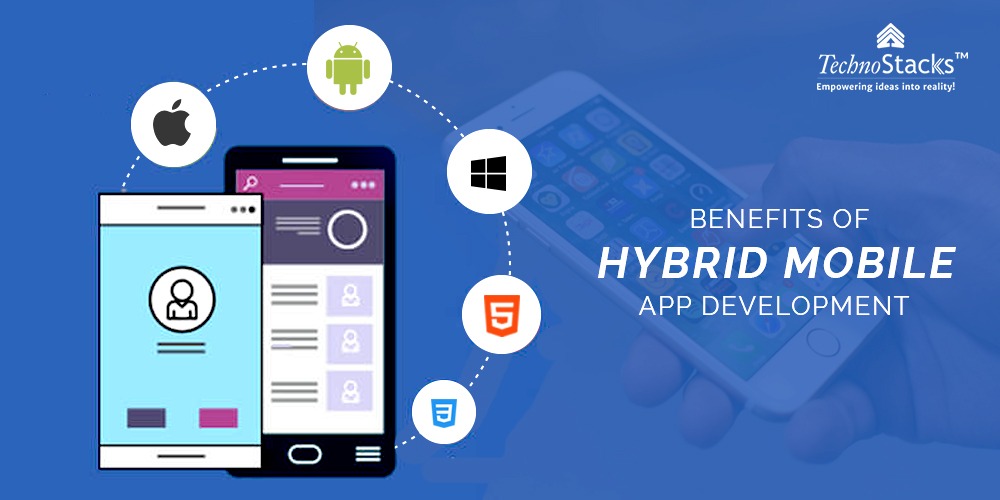Essential Needs, Features and Benefits of Hybrid App Development
In the beginning, when mobile app development was totally a new idea, it was ideal to build native mobile applications. However, now with the maturity and growth of mobile-based users, more application usage, and fragmentation of devices, they have come to recognize the advantages of multi-platform app development.
Hybrid mobile applications, inevitably, fall in the middle of the native and web application gamut. They are clear with the user experience elements and features of both web and native domains offering an assortment of uplifting benefits.
The Need for Hybrid Application Development
A hybrid application is not restricted to a picky operating system. It is written by using the standard web technologies including HTML5, JavaScript and CSS, along with 3rd party products to effectively “wrap” the code. They are further used as a native application for diverse mobile operating systems. Here it’s a need that a single application is developed just once and then deployed to numerous device categories.
For instance, a web-based application coded in HTML5, JavaScript and CSS can be united with a product such as Cordova and PhoneGap. These modernized products “wrap” the needed web application and output the application for manifold mobile operating solutions as well as required systems. The application is then made accessible at different stores including iTunes and Google Play.
Hybrid Mobile Application Development Features
- They support portability – one code platform and can be utilized on multiple platforms
- You can manage several hardware and software features by using diverse plugins
- Cost-effective mobile application development environment for all types of stakeholders
- Swift and quick way to build mobile applications with multiple features and functionalities
Advantages of Hybrid Mobile App Development
-
A Decrease in Development Costs
Developing a hybrid mobile app is comparatively cost-effective and gets the job done quicker relatively than any other native or web mobile application. In the intensely competitive digital world where ‘time to market’ has turned significant than continually, cost efficiency plays an essential role in assisting enterprises to create and get their product to the market in not much time.
With the assistance of a set of libraries and multiple development frameworks which include the latest ones such as Xamarin and PhoneGap, hybrid application developers can speed up the development procedure and submit the application to a range of app stores to in fact save efforts, time and overall costs
-
Enhanced UI/UX
A reliable user experience across multiple mobile platforms is one of the main rationales behind hybrid app’s recognition. Users anticipate the app to be right away responsive on diverse devices and set free a glitch-free experience.
Hybrid applications are based on the inspiration of “information is just a knock away.” And while it exhibits data speedier and fiddle with to changed device screen configurations instantly, it also solves the problems of the random data streaming abilities. It is also lightweight and so the hybrid app UI can be easily be loaded with the high-definition graphics and useful content.
-
Effortlessness Integrations
Similar to native apps, hybrid applications drive the device’s inner programming solution by an overlay which assists to deliver better synchronization with other well-suited apps. This decreases the integration problems for developers.
Again going around, the hybrid application works smoothly with the device’s native apps covering camera, messaging and GPS to make sure a better user experience.
-
Useful Offline Data & Information Support
Hybrid apps store the device’s API to save offline information and data that further helps to load the app swiftly. It moderately stores information that the users can obtain during poor or when there is no connectivity.
Since the majority of users want to trim down their mobile data usage and have nonstop access to application data, a hybrid app is competent of offering just that – offline app convenience without a performance drop down. It is one of the chief reasons why hybrid mobile apps are the most excellent when evaluated with native mobile applications.
-
Simple to Maintain and Sustain
Unlike a web application, a hybrid app is intended to make use of all the accessible features on hand in the mobile device. Despite the fact that native apps also use all the device functionalities and features, maintaining it is somewhat a challenge for users and developers. Developers need to roll out newer updates and fresh versions. On the other hand, users are needed to update the application each time a novel version is launched in the market.
A hybrid application bypasses versioning and makes app upholding as trouble-free as updating a website page, that also on a real-time basis. This level of suppleness further enables the scalability requirements of an enterprise.
Key Takeaways
A mobile app is a vital tool for enterprises to make a way into the market swiftly and remain competitive. And a hybrid application solution makes this job straightforward as well as speedier.
Giant organizations like Twitter, Uber, and Instagram have already driven their performance with the benefits of hybrid mobile app development. If you too are looking to make the most of this technology via a hybrid app, we can quickly connect and discuss your requirements today itself.








